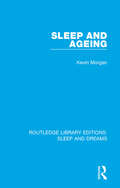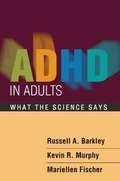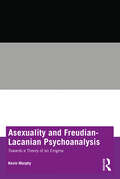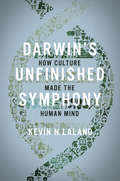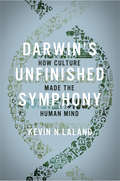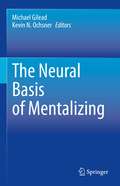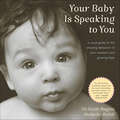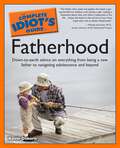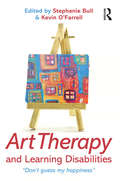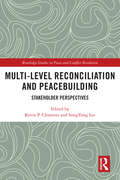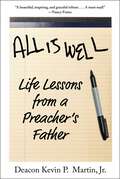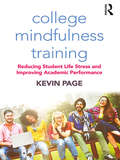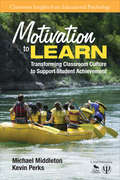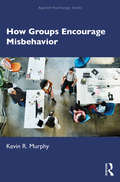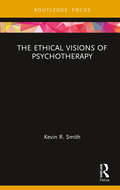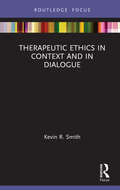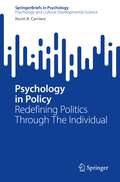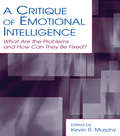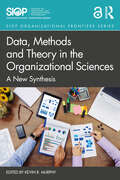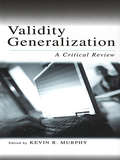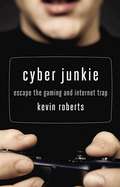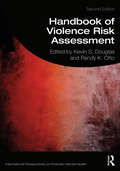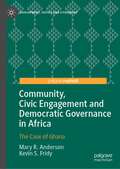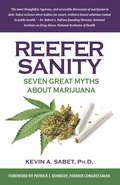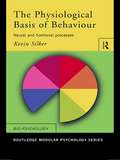- Table View
- List View
Sleep and Ageing (Routledge Library Editions: Sleep and Dreams #7)
by Kevin MorganSleeping patterns change with age, whether we are growing up, or growing old. While most people are prepared for the rapidly altering sleep patterns of growing children, the evidence suggests that many are unprepared for additional sleep changes in later life, either in themselves or in others. In this book, originally published in 1987, two research disciplines – social gerontology and sleep research – are brought together with the aim of providing a straightforward account of how sleep is changed and disrupted by the biological and social impact of ageing. Attention then focuses on the personal and clinical response to these changes. The use of sleeping drugs among elderly people is critically examined, and effective alternatives, including self-help practices and psychological therapies, are described. The influence of ageing on the recall and content of dreams is also considered. In the final chapter, the author comments on current styles of responding to sleep problems in old age and discusses the need and the scope for change. This book deals with topics of universal interest and provides valuable information for those professionally as well as personally concerned with sleep quality in later life, including health professionals (nurses, doctors, psychologists etc.) working with elderly people, gerontologists, and sleep researchers.
ADHD in Adults: What the Science Says
by Kevin Murphy Russell BarkleyProviding a new perspective on ADHD in adults, this compelling book analyzes findings from two major studies directed by leading authority Russell A. Barkley. Groundbreaking information is presented on the significant impairments produced by the disorder across major functional domains and life activities, including educational outcomes, work, relationships, health behaviors, and mental health. Thoughtfully considering the treatment implications of these findings, the book also demonstrates that existing diagnostic criteria do not accurately reflect the way ADHD is experienced by adults, and points the way toward developing better criteria that center on executive function deficits. Accessible tables, figures, and sidebars encapsulate the study results and methods.
Asexuality and Freudian-Lacanian Psychoanalysis: Towards a Theory of an Enigma
by Kevin MurphyAsexuality and Freudian-Lacanian Psychoanalysis: Towards a Theory of an Enigma proposes that asexuality is a libidinally founded desire for no sexual desire, a concept not included in psychoanalytic theory up to now. "Asexuality" is defined as the experience of having no sexual attraction for another person; as an emerging self-defined sexual orientation, it has received practically no attention from psychoanalytic research. This book is the first sustained piece of exploratory and theoretical research from a Freudian-Lacanian perspective. Using Freudian concepts to understand the intricacies of human sexual desire, this volume will also employ Lacanian conceptual tools to understand how asexuality might sustain itself despite the absence of Other-directed sexual desire. This book argues that asexuality holds a mirror to contemporary sexualized society which assumes sexual attraction and eroticism as the benchmarks for experiencing sexual desire. It also argues that asexuality may be a previously unrecognized form of human sexuality which can contribute new understandings to the range and breadth of what it means to be a sexual being. This book will be of interest to anyone in the area of asexuality or sexuality – psychoanalysts, psychotherapists, psychologists, psychiatrists, university lecturers, researchers, students or those simply curious about the possibilities of the human sex drive.
Darwin's Unfinished Symphony: How Culture Made the Human Mind
by Kevin N. LalandHumans possess an extraordinary capacity for cultural production, from the arts and language to science and technology. How did the human mind—and the uniquely human ability to devise and transmit culture—evolve from its roots in animal behavior? Darwin's Unfinished Symphony presents a captivating new theory of human cognitive evolution. This compelling and accessible book reveals how culture is not just the magnificent end product of an evolutionary process that produced a species unlike all others—it is also the key driving force behind that process.Kevin Laland shows how the learned and socially transmitted activities of our ancestors shaped our intellects through accelerating cycles of evolutionary feedback. The truly unique characteristics of our species—such as our intelligence, language, teaching, and cooperation—are not adaptive responses to predators, disease, or other external conditions. Rather, humans are creatures of their own making. Drawing on his own groundbreaking research, and bringing it to life with vivid natural history, Laland explains how animals imitate, innovate, and have remarkable traditions of their own. He traces our rise from scavenger apes in prehistory to modern humans able to design iPhones, dance the tango, and send astronauts into space.This book tells the story of the painstaking fieldwork, the key experiments, the false leads, and the stunning scientific breakthroughs that led to this new understanding of how culture transformed human evolution. It is the story of how Darwin's intellectual descendants picked up where he left off and took up the challenge of providing a scientific account of the evolution of the human mind.
Darwin's Unfinished Symphony: How Culture Made the Human Mind
by Kevin N. LalandHumans possess an extraordinary capacity for culture, from the arts and language to science and technology. But how did the human mind—and the uniquely human ability to devise and transmit culture—evolve from its roots in animal behavior? Darwin’s Unfinished Symphony presents a captivating new theory of human cognitive evolution. This compelling and accessible book reveals how culture is not just the magnificent end product of an evolutionary process that produced a species unlike all others—it is also the key driving force behind that process. Kevin Laland tells the story of the painstaking fieldwork, the key experiments, the false leads, and the stunning scientific breakthroughs that led to this new understanding of how culture transformed human evolution. It is the story of how Darwin’s intellectual descendants picked up where he left off and took up the challenge of providing a scientific account of the evolution of the human mind.
The Neural Basis of Mentalizing
by Michael Gilead Kevin N. OchsnerHumans have a unique ability to understand the beliefs, emotions, and intentions of others—a capacity often referred to as mentalizing. Much research in psychology and neuroscience has focused on delineating the mechanisms of mentalizing, and examining the role of mentalizing processes in other domains of cognitive and affective functioning. The purpose of the book is to provide a comprehensive overview of the current research on the mechanisms of mentalizing at the neural, algorithmic, and computational levels of analysis.The book includes contributions from prominent researchers in the field of social-cognitive and affective neuroscience, as well as from related disciplines (e.g., cognitive, social, developmental and clinical psychology, psychiatry, philosophy, primatology). The contributors review their latest research in order to compile an authoritative source of knowledge on the psychological and brain bases of the unique human capacity to think about the mental states of others. The intended audience is researchers and students in the fields of social-cognitive and affective neuroscience and related disciplines such as neuroeconomics, cognitive neuroscience, developmental neuroscience, social cognition, social psychology, developmental psychology, cognitive psychology, and affective science. Secondary audiences include researchers in decision science (economics, judgment and decision-making), philosophy of mind, and psychiatry.
Your Baby Is Speaking to You: A Visual Guide to the Amazing Behaviors of Your Newborn and Growing Baby
by Kevin NugentFrom an international expert on infant-parent communication, a rich and accessible gift book on baby “language,” gorgeously illustrated with forty black-and-white photographs.Through intimate access to babies and their families, Dr. Kevin Nugent and acclaimed photographer Abelardo Morell capture the amazingly precocious communications strategies babies demonstrate from the moment they are born.Your Baby Is Speaking to You illustrates the full range of behaviors—early smiling to startling, feeding to sleeping, listening to your voice and recognizing your face. The newest research—including information on subtle and fleeting behaviors not seen or explained in any other book—illuminates the meaning of the things babies do that concern and delight new parents: – the language of yawning – the rich range of cries, and how to understand their meanings – baby’s earliest “sleep smiles” and sleep states, and what they signify.Your Baby Is Speaking To You delivers the information parents crave in gentle, accessible style while giving parents the confidence they need to respond to their own baby’s way of communicating during the very first astonishing days and the months beyond.
The Complete Idiot's Guide to Fatherhood: Down-to-Earth Advice on Everything from Being a New Father to Navigating Adolesc
by Kevin OsbornYou're no idiot, of course. You know that life isn't like an old sitcom—when TV dads like Mike Brady or Ward Cleaver always had just the right answer for Greg, Marcia or the Beaver. But when it comes to earning the title "World's Greatest Dad," you feel like you're always going to be more like the father from Married with Children than the one from Father Knows Best. Don't retire your cardigan just yet! The Complete Idiot's Guide® to Fatherhood answers all the questions any expecting, new, or veteran father could have on topics ranging from communication and ground rules to privileges and punishment.
Art Therapy and Learning Disabilities: Don't guess my happiness
by Stephanie Bull Kevin O’FarrellIn this book Stephanie Bull and Kevin O’Farrell bring together practising clinicians who provide an insight into using contemporary art therapy with people with learning disabilities. The authentic voice of people who have learning disabilities is central to the book, and case examples, snapshots of thoughts, dialogue, photographs and artwork are included to ensure that the subjects' voices are heard. The book covers: having a learning disability loss and bereavement attachment and separation infantilisation fear powerlessness self and identity. This accessible and thought-provoking book is essential reading for anyone involved with people with learning disabilities including art therapists, psychotherapists, counsellors, students and carers.
Multi-Level Reconciliation and Peacebuilding: Stakeholder Perspectives (Routledge Studies in Peace and Conflict Resolution)
by Kevin P. Clements and SungYong LeeThis edited volume examines the group dynamics of social reconciliation in conflict-affected societies by adopting ideas developed in social psychology and the ‘everyday peace’ discourse in peace and conflict studies. The book revisits the intra- and inter-group dynamics of social reconciliation in conflict-affected societies, which have been largely marginalised in mainstream peacebuilding debates. By applying social psychological perspectives and the discourse of everyday peace, the chapters explore the everyday experience of community actors engaged in social and political reconciliation. The first part of the volume introduces conceptual and theoretical studies that focus on the pros and cons of state-level reconciliation and their outcomes, while presenting theoretical insights into dialogical processes upon which reconciliation studies can develop further. The second part presents a series of empirical case studies from around the world, which examine the process of social reconciliation at community levels through the lens of social psychology and discourse analysis. This book will be of much interest to students of peacebuilding, conflict resolution, social psychology, discourse analysis and International Relations in general.
All Is Well: Life Lessons from a Preacher's Father
by Kevin P. Martin Jr.A memoir of a parent&’s sudden passing from ALS, recalling life lessons learned and regaining faith in the process. Kevin P. Martin, Sr. was diagnosed with Lou Gehrig&’s Disease, better known as ALS, in August 2019. He died only a month later. Over a thousand people would attend the wake and funeral in South Boston—after all, Kevin Sr. was a leader in the Southie community and in the Catholic Church, both as a business owner and family man. But Kevin Jr. struggled with a bottomless grief; neither his father&’s example nor his own faith as a permanent deacon in the Archdiocese of Boston fully equipped him to cope with the loss.All Is Well is the story of the good life well-lived and life lessons Kevin Sr. taught his son. It&’s a story of how Kevin Jr. moved from darkness to light after his father&’s death. It is a memoir that gives a roadmap out of grief, taking a path whose landmarks are the Beatitudes, family, miracles, baseball, rites of passage, bucket lists, and love; it offers insights into leadership, marriage, parenting, resilience, practicality, suffering, giving, forgiveness, joy, and savoring the little things. It paints a portrait of a servant leader, a consummate professional and family man, and sheds light on the up-close realities of ALS. It offers one exceptional father&’s example for how we can better live a life without regrets, how we can make the best of the time we have, and how we can do the most good with the journey we&’re given. Part Tuesday's With Morrie and part Townie, this memoir offers solace and a path for those who are experiencing or have experienced grief from losing a parent, especially to terminal illness. Those that believe in a higher power (especially but not limited to the Catholic community), those from Boston and elsewhere in New England, and those looking to find lessons in the good life well-lived will readily find themselves in All is Well. 100% of this book&’s profits will go to ALS research, care charities, and support organizations.
College Mindfulness Training: Reducing Student Life Stress and Improving Academic Performance
by Kevin PageCollege Mindfulness Training is a ground-breaking book that carefully combines selected meditation exercises with guidance explaining the background, scientific context, and practical applications of mindfulness practice. More than just a meditation manual, this book details how and why personal mindfulness practice is essential for the college-aged student. In addition to extensive practical exercises for both beginner and intermediate-level meditation students, the author explores the kinds of institutions and organizations that have arisen out of the popular mindfulness movement and what career options in the field may be available in the future. Throughout the manual, the author provides readers with insights into basic meditation techniques; active and passive meditation techniques; Focused Attention Meditation in both guided and self-guided forms; Open Monitoring Meditation; informal meditation exercises; a brief history of the MBSR program and Koru meditation; a survey of current apps and meditation-supportive technology platforms; and detailed instructions for self-driven practice, and a semester-long outline for teachers. A captivating read, this book covers many of the essentials of mindfulness meditation and self-care of interest to college students, making it an essential tool for those of college age seeking to practice mindfulness meditation as well as college educators seeking a guided system to enhance their students’ emotional well-being and academic performance.
Motivation to Learn: Transforming Classroom Culture to Support Student Achievement
by Michael J. Middleton Kevin PerksHarness the power of motivation to transform the learning experience! When properly channeled, motivation propels learning forward. Yet teachers across all grade levels and disciplines struggle to recognize and cultivate this dynamic, social force in the classroom. This essential resource proves that all students are motivated to learn, and provides authentic tools to create and sustain a classroom community that is highly engaged. You’ll discover: Reflection activities that promote student voice and self-efficacy as well as assess existing motivation levels Case studies and best practices based on current motivation theory and research Strategies to design meaningful learning tasks and build positive relationships with students and colleagues.
How Groups Encourage Misbehavior (Applied Psychology Series)
by Kevin R MurphyHow Groups Encourage Misbehavior explores the psychological and social processes by which groups develop a tolerance for and even encourage misbehavior. Drawing from decades of research on social, cognitive and organizational psychology, as well as a deep well of historical research, this book shows how commitment to groups, organizations and movements can turn moral individuals into amoral agents. Pulling together what have been traditionally distinct areas of study, How Groups Encourage Misbehavior provides a detailed and unified account of how good organizations go bad and how groups of all types can push otherwise honest and upright individuals to behave in ways that violate laws and social norms. This text describes how social norms, rationalization, the characteristics of formal and informal groups, attachment to groups and organizations, and the structure of organizational life can all contribute to misbehavior. Each chapter includes one or more sidebar discussions of relevant and interesting examples to illustrate the ways groups and organizations encourage and support misbehavior. The final two chapters discuss how many of these same attributes and processes can be used to encourage positive behaviors and foster recovery from dysfunctional and corrupt cultures and modes of behavior. A valuable text for a broad range of psychology courses, How Groups Encourage Misbehavior will especially appeal to practitioners, scholars, and students interested in ethics in organizations and the intersection between social psychology and organizational behavior.
The Ethical Visions of Psychotherapy
by Kevin R SmithThe standard view of psychotherapy as a treatment for mental disorders can obscure how therapy functions as a social practice that promotes conceptions of human well-being. Building on the philosophy of Charles Taylor, Smith examines the link between therapy and ethics, and the roots of therapeutic aims in modern Western ideas about living well. This is one of two complementary volumes (the other being Therapeutic Ethics in Context and in Dialogue). This volume explores the links between therapeutic aims and conceptions of well-being. It examines several cognitive-behavioral and psychoanalytic therapies to illustrate how they can be distinguished by their divergent ethics. Smith argues that because research utilizing standard measures of efficacy shows little difference between the therapies, the assessment of their relative merits must include evaluation of their distinct ethical visions. A key text for upper level undergraduates, postgraduate students, and professionals in the fields of psychotherapy, psychoanalysis, theoretical psychology, and philosophy of mind.
Therapeutic Ethics in Context and in Dialogue
by Kevin R SmithThe standard view of psychotherapy as a treatment for mental disorders can obscure how therapy functions as a social practice that promotes conceptions of human well-being. Building on the philosophy of Charles Taylor, Smith examines the link between therapy and ethics, and the roots of therapeutic aims in modern Western ideas about living well. This volume builds on a complementary volume (The Ethical Visions of Psychotherapy), to explore therapeutic conceptions of human flourishing. Smith illustrates how therapeutic aims implicitly promote ideas about a good life, even though therapists rarely tell their patients how they should live. Taylor’s history of the modern identity provides a framework to examine the historical and cultural origins of therapeutic ethics. Utilizing Taylor’s work on practical reasoning and ethical debate, Smith considers the prospects for dialogue between the divergent ethical visions promoted by different psychotherapies. A key text for upper-level undergraduates, postgraduate students, and professionals in the fields of psychotherapy, psychoanalysis, theoretical psychology, and philosophy of mind.
Psychology in Policy: Redefining Politics Through The Individual (SpringerBriefs in Psychology)
by Kevin R. CarriereThis book takes an insider perspective of the psychological issues of creating policy. Instead of considering what the products of policy are - often the case in psychological and political science work - this book examines the individual processes present in proposing and engaging with policy. The individual who engages with the policy and its meanings, the individual who resists the policy through conformity, and the individual who writes the policy for their own ideological purposes are all political actors in a psychological system. This book puts forward a cultural political psychology as the psychological study of the process of values, policy, and power dynamics. Through exploring public policy through private policy generation and individual interaction, this book pushes theoretical understandings of policy and activism in new ways. Centering on an individual’s own values in facing various policy restrictions from governments, parents, or peers, the importance of examining collective actions and also collective inactions of individuals is noted and expanded on in the text. The book provides applications of its arguments through examining the processes of unionization and actualized democracy. It seeks to point out new research avenues, including the hypogeneralization of values, one’s exclusion through activism, and everyday revolutions. This book addresses the centrality of the individual and meaning-making systems when considering where policy, politics, and psychology intersect. This book is primarily addressed to psychologists and political scientists interested in how to make change in public policy. While the experiences within the book are United States-centric, the thoughts and theories behind them are meant to be applicable to a wide variety of political systems. As there is currently very little literature on the topic, this book seeks to fill the gap and offer concise information on such an important dimension of cultural and political psychology. It is expected that the book will be of great interest for researchers in these areas, as well as for graduate-level students. In particular, this book will be relevant to researchers and students working on political psychology, public policy, development, community psychology, social representations, semiotics, activism, and social movements, to name a few.
A Critique of Emotional Intelligence: What Are the Problems and How Can They Be Fixed? (Applied Psychology Series)
by Kevin R. MurphyThis book analyzes important criticisms of the current research on Emotional Intelligence (EI), a topic of growing interest in the behavioral and social sciences. It looks at emotional intelligence research and EI interventions from a scientific and measurement perspective and identifies ways of improving the often shaky foundations of our current conceptions of emotional intelligence. With a balanced viewpoint, A Critique of Emotional Intelligence includes contributions from leading critics of EI research and practice (e.g., Frank Landy, Mark Schmit, Chockalingam Viswesvaran), proponents of EI (e.g., Neal Ashkanasy, Catherine Daus), as well as a broad range of well-informed authors. Proponents claim that EI is more important in life than academic intelligence, while opponents claim that there is no such thing as emotional intelligence. Three key criticisms that have been leveled at emotional intelligence include: (1) EI is poorly defined and poorly measured; (2) EI is a new name for familiar constructs that have been studied for decades; and (3) claims about EI are overblown. While the book presents these criticisms, the final section proposes ways of improving EI research and practice with EI theories, tests, and applications.
Data, Methods and Theory in the Organizational Sciences: A New Synthesis (SIOP Organizational Frontiers Series)
by Kevin R. MurphyData, Methods and Theory in the Organizational Sciences explores the long-term evolution and changing relationships between data, methods, and theory in the organizational sciences. In the last 50 years, theory has come to dominate research and scholarship in these fields, yet the emergence of big data, as well as the increasing use of archival data sets and meta-analytic methods to test empirical hypotheses, has upset this order. This volume examines the evolving relationship between data, methods, and theory and suggests new ways of thinking about the role of each in the development and presentation of research in organizations. This volume utilizes the latest thinking from experts in a wide range of fields on the topics of data, methods, and theory and uses this knowledge to explore the ways in which behavior in organizations has been studied. This volume also argues that the current focus on theory is both unhealthy for the field and unsustainable, and it provides more successful ways theory can be used to support and structure research, and demonstrates the most effective techniques for analyzing and making sense of data. This is an essential resource for researchers, professionals, and educators who are looking to rethink their current approaches to research, and who are interested in creating more useful and more interpretable research in the organizational sciences.
Validity Generalization: A Critical Review (Applied Psychology Series)
by Kevin R. MurphyThis volume presents the first wide-ranging critical review of validity generalization (VG)--a method that has dominated the field since the publication of Schmidt and Hunter's (1977) paper "Development of a General Solution to the Problem of Validity Generalization." This paper and the work that followed had a profound impact on the science and practice of applied psychology. The research suggests that fundamental relationships among tests and criteria, and the constructs they represent are simpler and more regular than they appear. Looking at the history of the VG model and its impact on personnel psychology, top scholars and leading researchers of the field review the accomplishments of the model, as well as the continuing controversies. Several chapters significantly extend the maximum likelihood estimation with existing models for meta analysis and VG. Reviewing 25 years of progress in the field, this volume shows how the model can be extended and applied to new problems and domains. This book will be important to researchers and graduate students in the areas of industrial organizational psychology and statistics.
Cyber Junkie: Escape the Gaming and Internet Trap
by Kevin RobertsVideo gaming and Internet surfing are the top sources of entertainment for tens of millions of North Americans today. As these technologies continue to grow and flourish, so does the number of people becoming obsessively absorbed in the imagination and fantasy that they present. More and more people are isolating themselves, turning their backs on reality, ignoring family and friends, and losing sleep and even their jobs due to excessive use of video games and the Internet, and they continue to do so despite harmful consequences to their mental, physical, and spiritual health, a telltale sign of addiction. In this groundbreaking book, recovering video game addict Kevin Roberts uses extensive scientific and social research, complemented by his and others' personal stories, to give compulsive gamers and surfers--and their family and friends--a step-by-step guide for recovery. He outlines the ways that 'cyber junkies' exhibit the classic signs of addiction and reveals how they can successfully recover by following a program similar to those used for other addictions. Readers learn to identify whether they have an addiction, find the right resources to get individualized help, and regain a rewarding life away from the screen by learning new thoughts and behaviors that free them from the cravings that rule their lives. Included is a guide for parents for working with their addicted children. Kevin Roberts is a recovering video game addict who runs support groups to help others struggling with cyber addiction get their lives back on track. He is a nationally recognized expert on video gaming addiction and a regular conference speaker. Roberts has a background in education and is the developer of a sixteen-module curriculum designed to give those with attention deficit/hyperactivity disorder (ADHD), often a driving factor of video game and internet addiction, the skills they need to succeed. Cyber Junkie is his first book.
Handbook of Violence Risk Assessment (International Perspectives on Forensic Mental Health)
by Kevin S. Douglas; Randy K. OttoThe Handbook of Violence Risk Assessment, Second Edition, builds on the first edition’s comprehensive discussion of violence risk assessment instruments with an update of research on established tools and the addition of new chapters devoted to recently developed risk assessment tools. Featuring chapters written by the instrument developers themselves, this handbook reviews the most frequently used violence risk assessment instruments—both actuarial and structured professional judgment—that professionals use to inform and structure their judgments about violence risk. Also included are broader chapters that address matters such as the consideration of psychopathy and how the law shapes violence risk assessment. Already the primary reference for practitioners, researchers, and legal professionals in this area, this second edition’s easy-to-access, comprehensive, and current information will make it an indispensable reference for those in the field.
Community, Civic Engagement and Democratic Governance in Africa: The Case of Ghana (Development, Justice and Citizenship)
by Mary R. Anderson Kevin S. FridyThis book explores how community influences civic engagement, focusing on the case of Ghana. It offers an interdisciplinary perspective to those studying psychology, political development and civic engagement in African countries. Previous research has shown that the social and economic context in which an individual interacts influences their political behaviors and attitudes, and that personal characteristics account for differences in political behavior and attitudes. This work moves away from the cultural demographics of a person, which often take center stage in existing investigations of partisan political behavior in the African context, and addresses the following five questions: (1) To what extent do individual traits influence civic engagement in Ghana? (2) To what extent is community identity similar or different in small rural villages versus large metropolitan areas in Ghana and how does community identity influence civic engagement? (3) To what extent does trust influence civic engagement in Ghana? (4) What factors and activities influence political knowledge and how does political knowledge influence civic engagement? (5) What is the status of women in civic engagement?
Reefer Sanity: Seven Great Myths About Marijuana
by Kevin SabetIn this book, Kevin A. Sabet argues that the United States should not legalize pot with all of its attendant social costs, nor damage the future prospects of pot smokers by prosecuting and jailing them.
The Physiological Basis of Behaviour: Neural and Hormonal Processes
by Kevin SilberThe Physiological Basis of Behaviour deals with the basic structures of the central nervous system, the techniques used in neuroscience and examnines how drugs affect the brain.
